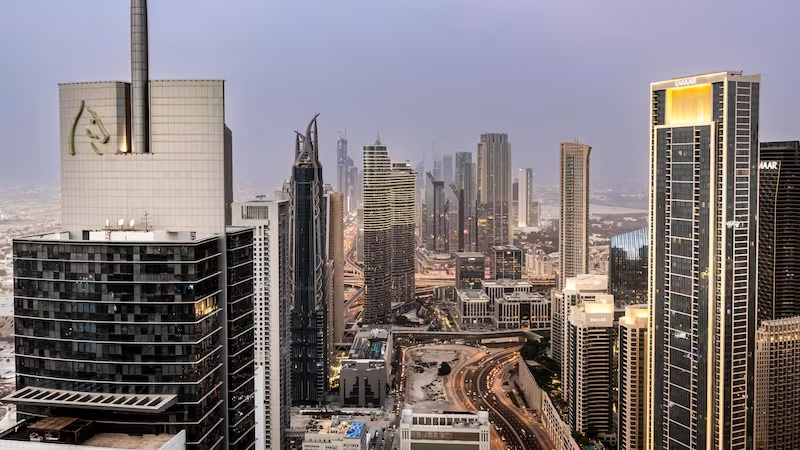Dubai is to allow private property owners of all nationalities in the Sheikh Zayed Road and Al Jaddaf areas to convert their ownership to freehold status, in a move aimed at boosting the city’s position as a major hub for real estate investment.
A total of 457 plots are eligible for conversion to freehold – 128 on Sheikh Zayed Road, from the Trade Centre roundabout to the Dubai Canal, and 329 plots in Al Jaddaf, Dubai Land Department said on Sunday.
Under freehold ownership, an investor has a direct title of ownership of the property and the land on which it is built.
“The initiative is set to benefit landowners in these areas by enhancing the market value of their properties, particularly for those opting to convert their land to freehold ownership,” the department said. “It is also expected to increase the economic appeal of these locations, paving the way for real estate developments tailored to freehold investors and attracting a new wave of investment to Sheikh Zayed Road and Al Jaddaf.”
The move will drive “significant growth” in Dubai’s real estate sector, reinforcing Dubai’s position as a global economic hub and a “leading destination” for real estate investment, said Marwan Ahmed bin Ghalita, director general of the department.
Analysts say the announcement has wide-reaching implications for foreign investment in Dubai’s real estate market.
“This news is huge because it could be the beginning of what I suppose will be the opening up of all areas to be bought by non-locals,” Mario Volpi, head of brokerage at Novvi Properties, told The National.
“Clearly, anyone that currently owns plots or real estate in these locations has effectively now got a boost as prices will obviously be increased over time after this announcement. Real estate is governed by market forces, so as long as there is demand, the prices will increase.”
The initiative will make Dubai “a magnet” for global investors, and is part of the government’s plans to boost the overall economy, Mr Volpi added.
The move is expected to stimulate demand for property in Dubai, agreed Declan King, senior partner and group head of real estate at ValuStrat.
It is a “very progressive step” towards opening up prominent Dubai locations to real estate investment by all nationalities, Mr King told The National.
“This has the potential to allow both whole building and individual unit sales to all citizens, in areas that previously could only be owned by UAE and GCC nationals,” Mr King said.
“Opening-up of the area of Sheikh Zayed Road, between World Trade Centre roundabout and the Water Canal, is bound to attract strong buyer demand – especially in the current buoyant property market that Dubai is enjoying.”
The locations on Sheikh Zayed Road between the Trade Centre and Dubai Water Canal, as well as Al Jaddaf on the other side, have added significant new freehold land into the mix, said Matthew Green, head of research at CBRE Mena.
“While many of the plots along Sheikh Zayed Road are already developed out, remaining lands are now likely to attract increased investor interest, offering opportunities to leverage prime locations close to the financial centre and other major demand generators,” he told The National.
“While we await further clarity on the new ruling, including the related fees for freehold conversion, we believe this move will positively boost demand dynamics and ultimately help to stimulate further investments into the Dubai market, by effectively expanding the addressable market for foreign investors.”
The total number of real estate transactions in Dubai reached 188,000 with a combined value of Dh625 billion ($170 billion) as of November. This represents a 38 per cent increase in volumes and a 23 per cent rise in values year-on-year basis, according to the government department’s data.
The emirates last year also revealed the Dubai Real Estate Sector Strategy 2033, which aims to double the real estate sector’s contribution to Dubai’s GDP to approximately Dh73 billion and increase home ownership rates to 33 per cent in the next decade. It also aims to grow real estate transactions by 70 per cent and raise the market value to Dh1 trillion.
Process to convert ownership
Property owners can check their eligibility for the conversion through the “Dubai REST” app. They must submit an application to the department for land assessment and valuation to proceed with the conversion.
Common area fees and service charges will be determined as per Real Estate Regulatory Authority guidelines. After this, a conversion fee of 30 per cent of the property’s valuation (based on gross floor area) will be applicable.
Once the payment is processed, a map and freehold ownership title deed will be issued for the converted property.
Freehold v leasehold
Freehold ownership means buying a property in a designated area, which allows investors to own the property and the land it is built on forever.
On the other hand, leasehold ownership means that the investor owns the property, but not the land it is built upon, for a period of up to 99 years. After this period, everything goes back to the freeholder.
The Freehold Decree, a property law in Dubai enacted in 2002, allowed foreigners aged 21 and older to buy, sell, lease and rent properties in certain areas of Dubai under freehold ownership.
There are various benefits to freehold ownership, according to Engel and Volkers, a real estate services company.
“The property owner can make desired changes to the property, pass it on to an heir, and decide whether to sell, lease, or stay in the property,” the company said. Other benefits include a long-term residential visa in Dubai and a high return on investment.
“When it comes to freehold property areas in Dubai, studies estimate a 7-10 per cent return on property investment. If you have invested in a freehold property and wait for the right time, you can gain tremendous returns on your investment.”


